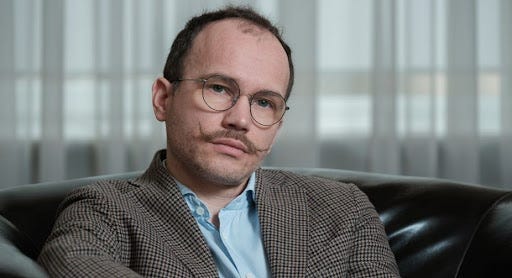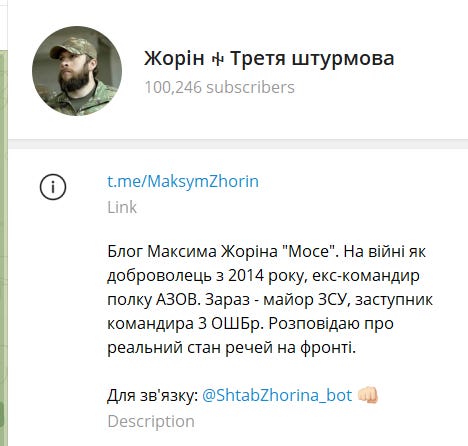Proles and paramedics to the front - clowns and police stay
Mobilization news, June 8-16. Traitors, number wars and paramedic fights.
Traitors
The current line (occasionally half-heartedly criticized by various government officials) is to call on Ukrainians abroad to return home to undergo military checks (read: mobilization), ‘or else’. The trouble is that the last bit isn’t very clear, but the potential downsides of joining the army are quite obvious.
Some government officials have been threatening to remove citizenship for Ukrainian draft-dodgers abroad, but from what I can tell on social media those abroad are quite busy trying to figure out how to get rid of their passports as quickly as possible.
Luckily Ukraine’s strongest minds are hard at work on a solution. On June 11, Fedor Venislavsky - chairman of the Defense and State Security Parliamentary Committee - told Azerbaijani media that ‘Ukrainian citizens not complying with requests to come to the territorial centers of recruitment and social support will be put on a wanted list’.
As if that wasn’t enough motivation, on the same day Zelensky called on Ukrainians to return home immediately. Overflowing with positivity and can-do attitude, the president gave the following injunction while in Berlin:
After the war ends, everyone will come to rebuild Ukraine, there will be places, there will be safety. But we are in favor of Ukrainians coming from abroad even now.
Meanwhile, Ukrainska Pravda (Ukraine’s western-funded NYT) published a column criticizing the government approach of calling Ukrainians abroad traitors - In effect, the state is pushing the Ukrainian citizen to choose: either return to Ukraine as soon as possible and augment our mobilization resources, or sever all ties with Ukraine.
The article goes on to compare Ukraine to Israel, claiming that the latter’s strength is in its ability to leverage its diaspora as foreign influence, while Ukraine is cutting off ties with its diaspora. It claims that Ukraine is following the Soviet example, not the ideal Israeli one. Is it really a liberal Ukrainian think-piece without strained analogies to Israel and the Soviet Union?
One of the more interesting parts of the article was where it remembered how even before the war, Zelensky was quite fixated on the idea of the moral necessity for Ukrainians working abroad to return home.
Though on that point, one should note that Ukrainska Pravda editors would tend to think that labor emigration is a natural and commendable tendency of the invisible hand, and any attempts to reindustrialize at home and reverse migration flows is an example of execrable neo-soviet socialist protectionism. Way back when, I wrote about Zelensky’s government’s attempt to implement some minimal industrial protectionism, only to be stymied by the likes of Ukrainska Pravda.
On June 12, the minister of justice stated that more and more services will only be provided to those with mobilization documents. According to him, ‘luxury services’ will no longer be available for those evading mobilization. What he meant by that remained unclear. I’d note that he looks like quite a fan of luxury services.
Luckily, it’s becoming easier and easier to join the army. On June 9, the government made it easier for Ukrainians abroad to enter their mobilization details. Even better - from June 16, draft summons will be sent by mail.
Poor proles
Currently 700 thousand men have economic exemption from mobilization. Inly 4000 IT workers are among them. This is surprising, given that the post-euromaidan line in Ukraine has been to glorify IT employees as the economic (and political) vanguard of the nation, with Poroshenko often claiming that Ukraine’s economy, now blissfully freed of its ‘ineffective Soviet, eastern industry’, can now get rich through IT and agriculture.
That means only 1.5% of all the country’s IT professionals are exempted from mobilization. Meanwhile, the ministry of culture has reserved 40% of its employees. There was a notable scandal in April because the clowns employed by state circuses were explicitly exempted from mobilization. The circuses are officially considered ‘critical infrastructure’, and hence all their employees are exempted.
The same is true for the infamous state telemarathon. According to strana.ua, their sources at state media said that this was the only way to motivate employees not to quit. Ukrainian job seeking websites are filled with vacancies at state-owned television, which is widely-derided for its distortion of the truth and vile chauvinism.
The topic of so-called ‘economic exemptions’ is also of the order of the day, as always. This refers to the proposition whereby individuals with high incomes can pay a special tax to avoid mobilization. Its advocates defend it by reference to the vast supposed tax income this would generate, though this seems to somewhat overestimate Ukraine’s prosperity (in 2020, 85% of Ukrainians earned less than $290 USD a month).
Its critics, which even include the Azov Battalion, argue that it would further divide society and threaten the already frail (to say the least) legitimacy of mobilization. This was what Major Maksym Zhorin, one of Azov’s top figures, said about it in early January:
I'll write separately about another crazy idea - "exemption from mobilization" for money.
Let's be honest - they already primarily take not the wealthiest citizens, scooping up people from villages and small towns. This will undoubtedly add even more division in society, and it certainly doesn't look like justice.
It would be better to work with the population so that they are not more afraid of ending up in the army than dying from hypothermia somewhere on the banks of the Tisa river. And show through the example of officials, media personalities, etc., that being in the military is an honor, not a punishment.
By constantly bringing up the topic, even if to dismiss it soon after, the government is acclimatizing the population to it. Just like the question of mobilizing women.
On June 12, the head of the Rada's defense committee, Zavitnevich, said that economic exemptions
'will definitely exist in some form… Society is split here. We do not divide between the poor and the rich, sorry. But still, we will be looking for some balance because, I repeat, there is no front without a rear, and no rear without a front. Without our economy, without taxes, there will be nothing to finance the front … objectively, people do not want to go serve, they are hiding, not appearing in the military enlistment offices."
So far, no specifics. In a recent post, I quoted jailed parliamentarian Dubinsky on it -
The parliament is preparing to introduce a 'tax on life,' only they can't decide on its level – 20 or 35 thousand hryvnias per month for the right not to die for a great cause, and to transfer this right to less financially successful citizens.
Fights
On June 11, a mobilization-related crisis in Odessa’s health sector erupted. I’m sure many of my readers saw the dramatic videos where paramedics, mobilization officers, and a variety of other characters duked it out in the streets of the Black Sea’s Miami.
While 100% of all police are exempted from mobilization, paramedics aren’t. In a telegram post I translated here, Kost’ Bondarenko wrote about the ‘hyper-Hobbesianism’ that wartime Ukraine is embracing. The leviathan needs policemen, not doctors.
Bogdan Velichko, one of the paramedics involved, explained the details of the fight. According to him, it all started he and his colleagues were called to an emergency at the mobilization office, where an ambulance driver was suffering from head injuries and nausea.
Keep reading with a 7-day free trial
Subscribe to Events in Ukraine to keep reading this post and get 7 days of free access to the full post archives.





